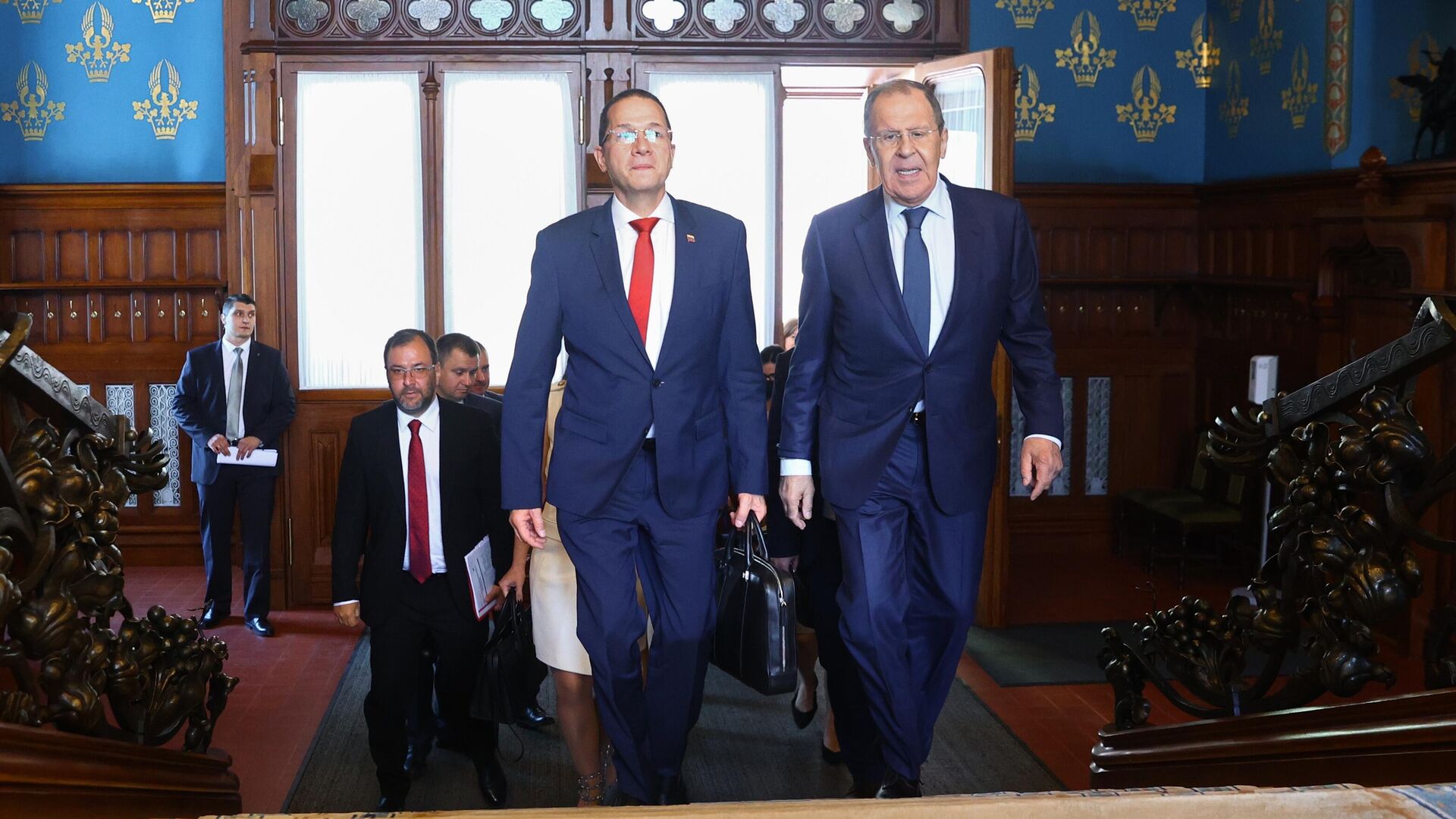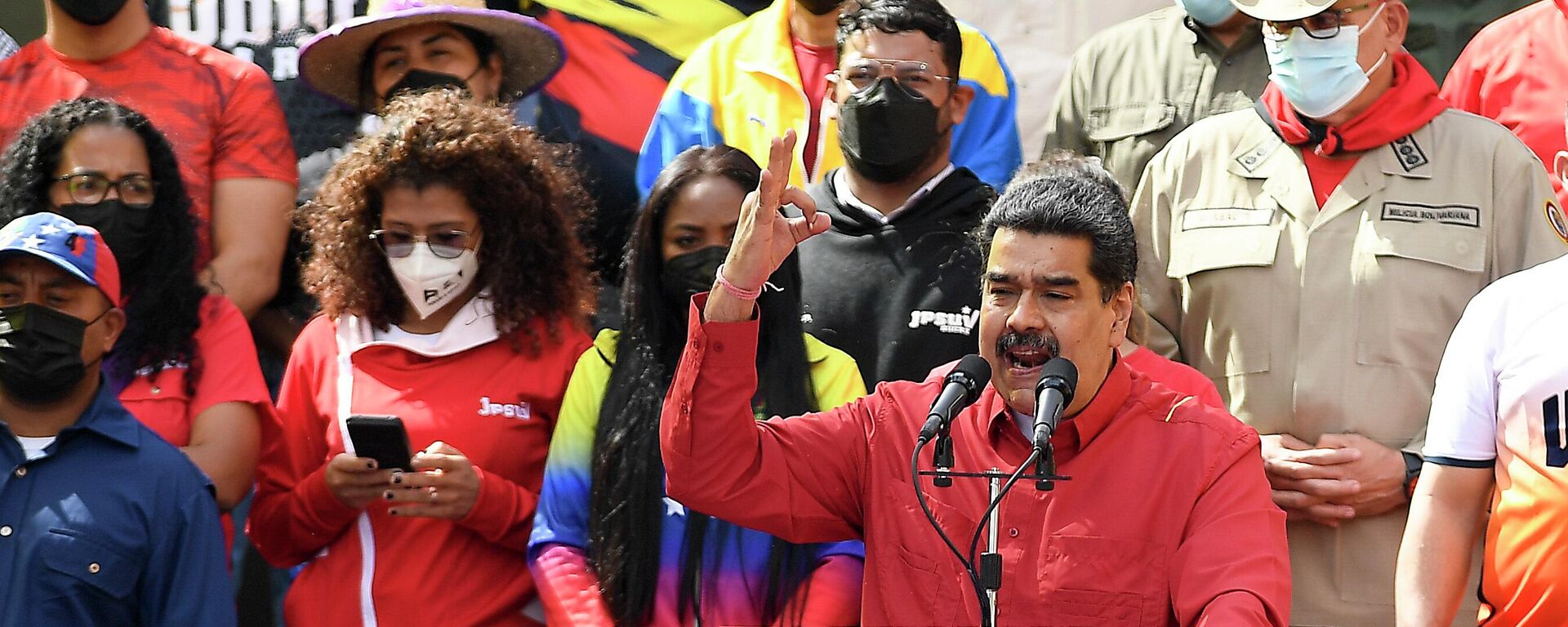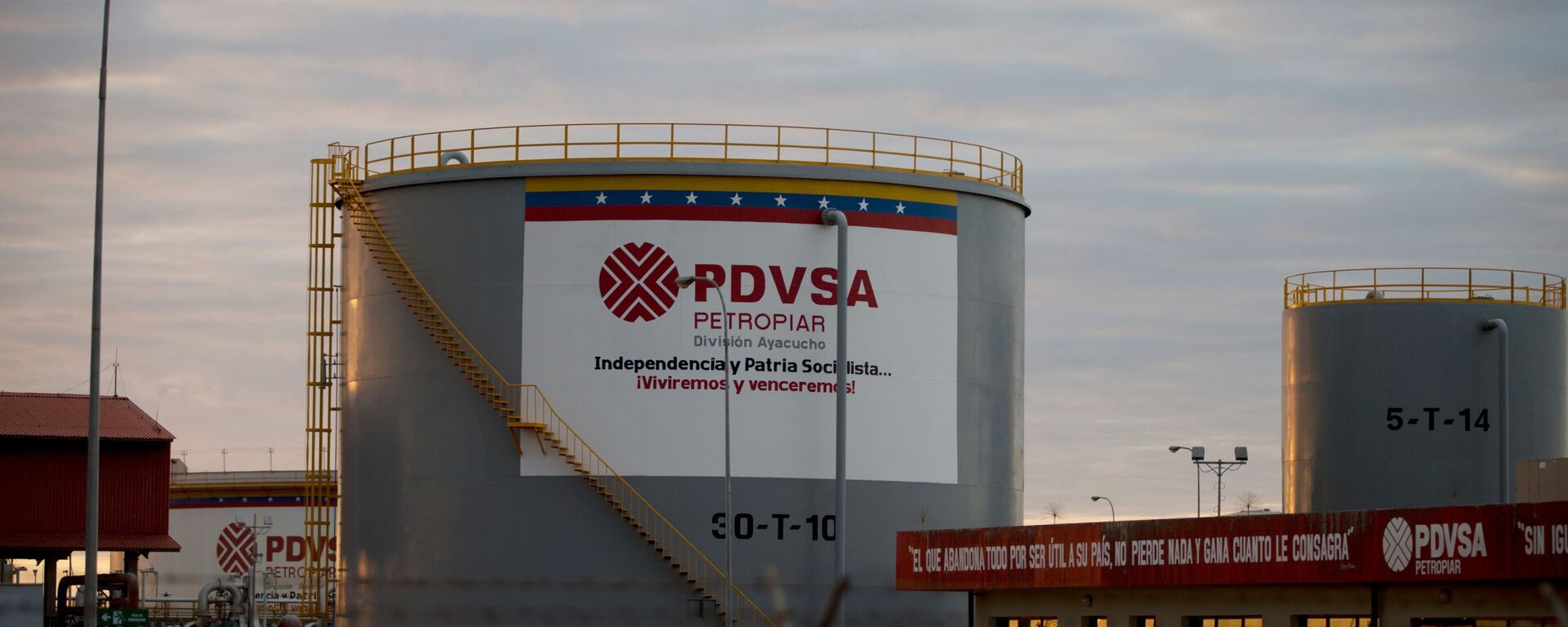https://sputnikglobe.com/20220704/russia-venezuela-to-expand-oil-sector-cooperation-working-on-pact-to-circumvent-western-sanctions-1096937993.html
Russia, Venezuela to Expand Oil Sector Cooperation, Working on Pact to Circumvent Western Sanctions
Russia, Venezuela to Expand Oil Sector Cooperation, Working on Pact to Circumvent Western Sanctions
Sputnik International
Moscow and Caracas have dramatically expanded economic, political, and defense ties over the past two decades, with the United States placing crushing... 04.07.2022, Sputnik International
2022-07-04T11:15+0000
2022-07-04T11:15+0000
2022-07-04T15:15+0000
venezuela
russia
cooperation
visit
https://cdn1.img.sputnikglobe.com/img/07e6/07/04/1096938985_0:166:3127:1925_1920x0_80_0_0_f2b74b1ceef7dd660860fecd72645751.jpg
Russia and Venezuela will continue to expand their cooperation in the oil sector, and are working on new agreements to circumvent Western sanctions in finance and logistics, Venezuelan Foreign Minister Carlos Faria has indicated."As far as cooperation in the energy sector is concerned, it never stopped since the rapprochement between our countries. We are working on specific projects with Russian companies, and are continuing to deepen this work. We hope to reach an agreement on ways to circumvent the existing obstacles, to solve problems related to financial mechanisms", Faria said, speaking to Russian Foreign Minister Sergei Lavrov in Moscow on Monday.Emphasizing Caracas' "extremely negative view" of US attempts at sanctions pressure, Faria said that when it came to sanctioning Russia, Washington's policy backfired and hit ordinary Americans and Europeans instead.The foreign minister expressed hope that Moscow and Caracas can overcome roadblocks connected to US restrictions. "The conditions in which we found ourselves thanks to the actions of the US administration hindered the development of the oil industry," Faria said, specifying that sanctions have affected investments, financing, loans, and the purchase of equipment and spare parts.Pointing to the alternative finance systems worked out by Russia, China, and India to circumvent the West's attempted "blockade" against Moscow, Faria noted that "more and more countries are interacting with Russia, and they are not afraid of the consequences they are being threatened with."The Venezuelan top diplomat also expressed support for Russia's position on the crisis in Ukraine, saying Caracas sees Russia's readiness for dialogue and negotiations, and hopes that an agreement is ultimately reached which takes into account the interests of both Moscow and Kiev."I would like to thank you, as well as Russian President Vladimir Putin and the Russian government for the political support of the national processes that are taking place in Venezuela. I'm speaking about Russia's participation in the role of mediator in talks with the Venezuelan opposition," Faria added.Lavrov welcomed the "normalization of the situation in and around Venezuela," and promised that Moscow would continue to "contribute" to the country's sustainable development "in any way we can.""As our presidents have agreed, we have reaffirmed our focus on the deepening of political dialogue, of economic, trade, cultural and humanitarian exchanges. We agreed to promote mutually beneficial projects in a host of areas, including energy, pharmaceuticals, industry, transport and military-technical cooperation", Lavrov said. The foreign minister also revealed that the two countries have hammered out an agreement on space cooperation, under which Russia will be able to place a ground-based GLONASS satellite navigation system station in Venezuela.Russia and Venezuela enjoy warm ties, with relations dramatically improving under the late President Hugo Chavez, a leftist president who came to power on the wave of the Bolivarian Revolution and began to institute a broad range of socio-economic, political, and foreign policy reforms which severely strained Caracas' ties with Washington.Despite the vast geographic distance between them, Moscow and Caracas have built up close economic, trade, and defense ties, with the significance of this relationship demonstrated when the US attempted a coup d'etat against the government of President Nicolas Maduro in 2019 and placed crushing economic pressure on Caracas. Russia, China, and Iran provided significant diplomatic, economic and other assistance to Venezuela to ease the blow, and have expanded cooperation with the Latin American nation to help it achieve economic independence from its powerful neighbor to the north. Venezuela has reciprocated by supporting its partners diplomatically at various international venues, and by welcoming Russian, Chinese, and Iranian businesses to develop the country's resources and industry.
https://sputnikglobe.com/20220621/venezuela-is-part-of-irans-axis-of-resistance-maduro-says-1096533388.html
https://sputnikglobe.com/20220605/oil-shipments-from-venezuela-to-europe-may-resume-soon-with-tacit-us-approval-says-media-1096035355.html
venezuela
Sputnik International
feedback@sputniknews.com
+74956456601
MIA „Rossiya Segodnya“
2022
News
en_EN
Sputnik International
feedback@sputniknews.com
+74956456601
MIA „Rossiya Segodnya“
Sputnik International
feedback@sputniknews.com
+74956456601
MIA „Rossiya Segodnya“
venezuela, cooperation, visit
venezuela, cooperation, visit
Russia, Venezuela to Expand Oil Sector Cooperation, Working on Pact to Circumvent Western Sanctions
11:15 GMT 04.07.2022 (Updated: 15:15 GMT 04.07.2022) Moscow and Caracas have dramatically expanded economic, political, and defense ties over the past two decades, with the United States placing crushing sanctions on the Latin American nation and repeatedly attempting to institute regime change in the country over its attempts to secure independence from Washington's influence.
Russia and Venezuela will continue to expand their cooperation in the oil sector, and are working on new agreements to circumvent Western sanctions in finance and logistics, Venezuelan Foreign Minister Carlos Faria has indicated.
"As far as cooperation in the energy sector is concerned, it never stopped since the rapprochement between our countries. We are working on specific projects with Russian companies, and are continuing to deepen this work. We hope to reach an agreement on ways to circumvent the existing obstacles, to solve problems related to financial mechanisms", Faria said, speaking to Russian Foreign Minister Sergei Lavrov in Moscow on Monday.
Emphasizing Caracas' "extremely negative view" of US attempts at sanctions pressure, Faria said that when it came to sanctioning Russia, Washington's policy backfired and hit ordinary Americans and Europeans instead.
"The aim of these sanctions was not achieved. This is a very serious miscalculation, a miscalculation I would characterize as unforgivable. And the problems which the economies of the United States and the European Union have run into are the result of this miscalculation. Today, they do not know how to resolve the difficulties that have arisen, how to return life to normal. And I think this will certainly hit the people of these countries," he said.
The foreign minister expressed hope that Moscow and Caracas can overcome roadblocks connected to US restrictions. "The conditions in which we found ourselves thanks to the actions of the US administration hindered the development of the oil industry," Faria said, specifying that sanctions have affected investments, financing, loans, and the purchase of equipment and spare parts.
Pointing to the alternative finance systems worked out by Russia, China, and India to circumvent the West's attempted "blockade" against Moscow, Faria noted that "more and more countries are interacting with Russia, and they are not afraid of the consequences they are being threatened with."
The Venezuelan top diplomat also expressed support for Russia's position on the crisis in Ukraine, saying Caracas sees Russia's readiness for dialogue and negotiations, and hopes that an agreement is ultimately reached which takes into account the interests of both Moscow and Kiev.
"I would like to thank you, as well as Russian President Vladimir Putin and the Russian government for the political support of the national processes that are taking place in Venezuela. I'm speaking about Russia's participation in the role of mediator in talks with the Venezuelan opposition," Faria added.
Lavrov welcomed the "normalization of the situation in and around Venezuela," and promised that Moscow would continue to "contribute" to the country's sustainable development "in any way we can."
"As our presidents have agreed, we have reaffirmed our focus on the deepening of political dialogue, of economic, trade, cultural and humanitarian exchanges. We agreed to promote mutually beneficial projects in a host of areas, including energy, pharmaceuticals, industry, transport and military-technical cooperation", Lavrov said. The foreign minister also revealed that the two countries have hammered out an agreement on space cooperation, under which Russia will be able to place a ground-based GLONASS satellite navigation system station in Venezuela.
"We know how seriously the Americans and their allies sought, seek and will continue to seek to undermine the foundations of the Venezuelan economy. It's already clear now that these plans will not come to pass. The Venezuelan economy is demonstrating its capability to withstand this sort of pressure. And of course, we will help in every possible way," Lavrov stressed.
Russia and Venezuela enjoy warm ties, with relations dramatically improving under the late President Hugo Chavez, a leftist president who came to power on the wave of the Bolivarian Revolution and began to institute a broad range of socio-economic, political, and foreign policy reforms which severely strained Caracas' ties with Washington.
Despite the vast geographic distance between them, Moscow and Caracas have built up close economic, trade, and defense ties, with the significance of this relationship demonstrated when the US attempted a coup d'etat against the government of President Nicolas Maduro in 2019 and placed crushing economic pressure on Caracas. Russia, China, and Iran provided significant diplomatic, economic and other assistance to Venezuela to ease the blow, and have expanded cooperation with the Latin American nation to help it achieve economic independence from its powerful neighbor to the north. Venezuela has reciprocated by supporting its partners diplomatically at various international venues, and by welcoming Russian, Chinese, and Iranian businesses to develop the country's resources and industry.




